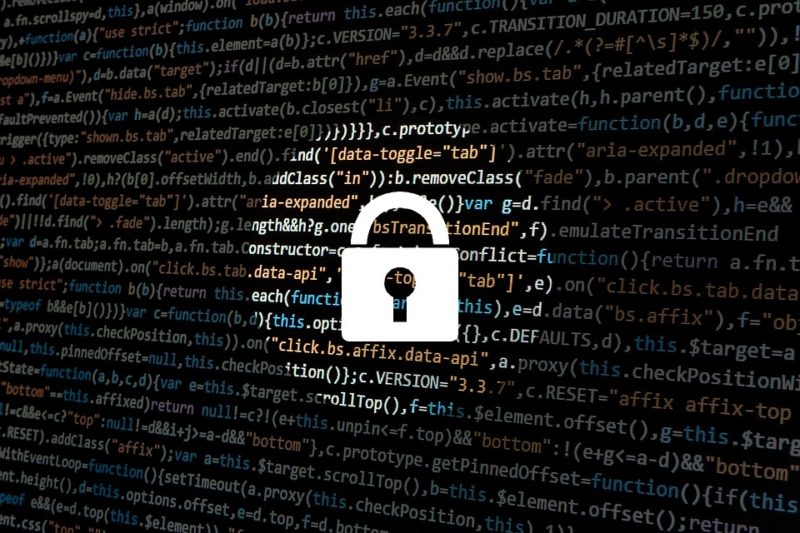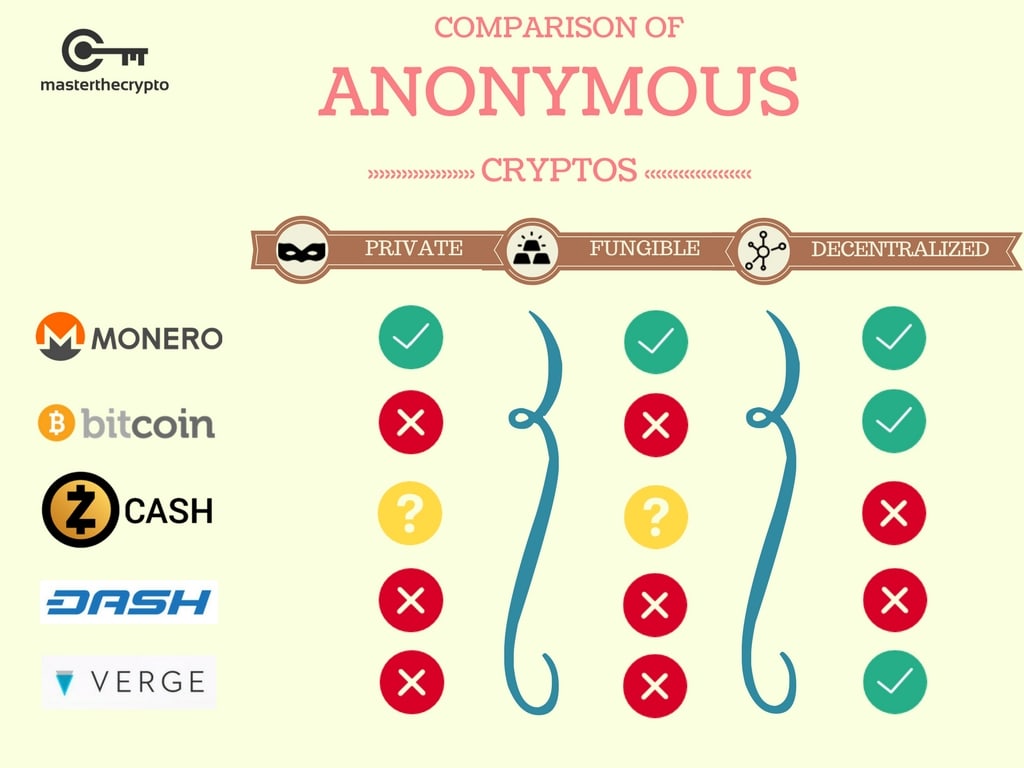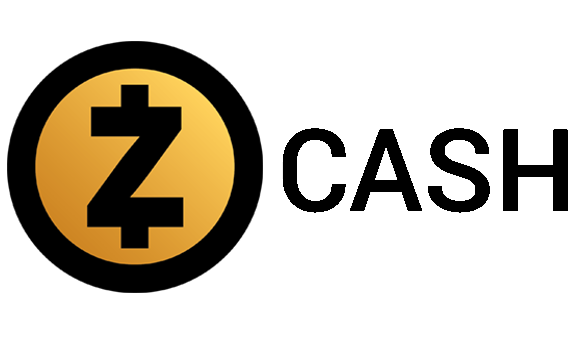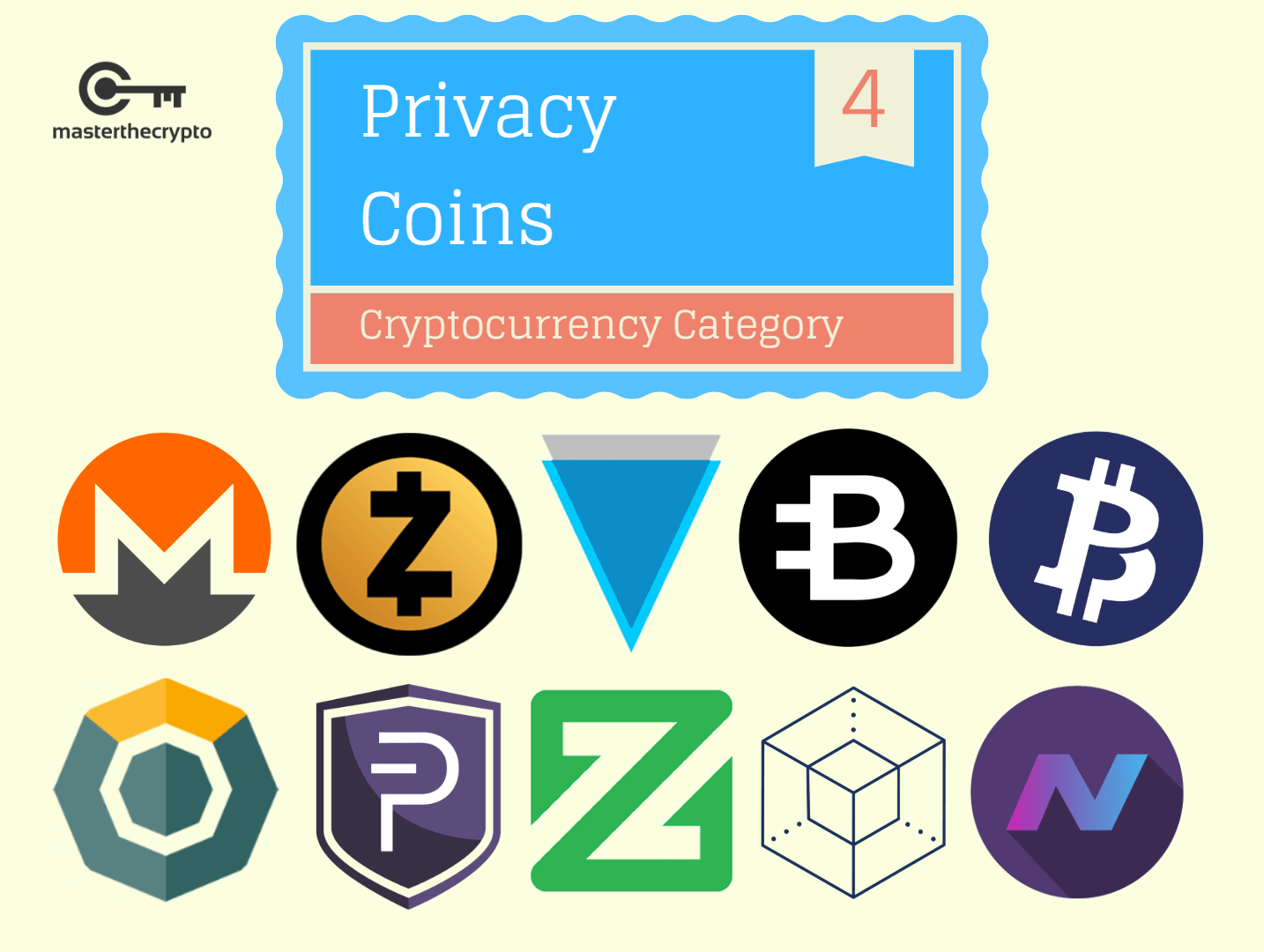Some of the links in this post are from our sponsors. We provide you with accurate, reliable information. Read our Advertising Disclosure.

Article Overview: This article compares the different types of privacy-centric and anonymous cryptocurrencies that includes Monero, Bitcoin, Zcash, Dash and Verge. This was first published on Monero's Reddit channel.
The ideological roots of Bitcoin – and cryptocurrencies in general – stem from the need for decentralizing the current monetary system, shifting the power and control assumed by the government and big banks to the masses.
This refreshing notion of empowerment aims to make the financial system as free and transparent as possible, through complex cryptographic technology.
This technology is called Blockchain, and its encryption features allow high degrees of security and privacy. (Read also: Guide to Common Crypto Terms)
Enhanced privacy and anonymity regrettably become a natural attraction for criminals and those engaged in illegal activities, and this became the main narrative against Bitcoin and generally, cryptocurrencies.
But embracing privacy and anonymity doesn’t mean you’re a criminal; it just simply means that you’re redeeming your rights to have absolute control over your privacy.
Cryptocurrencies represent a conducive medium to exercise your rights to privacy.
(See also: Coins, Tokens & Altcoins: What’s the Difference?)
Learn How to Make Over 100% Returns Investing in Crypto
Comparison of Privacy & Anonymous Cryptocurrencies
With a myriad of coins available in the open market, let’s take a look at the different coins that champions itself as a torchbearer of privacy and anonymity. We’ll be assessing these coins based on 3 metrics:
- Privacy: The amount of coins you own, send and receive are not observable, traceable nor linkable by way of transaction history on the Blockchain
- Fungibility: Every coin is worth the same value and is thus mutually interchangeable. No coin risks potential blacklisting nor debasement due to deprecating transaction history.
- Decentralization: All nodes have equal power and control; there are no nodes that have more influence than others, i.e. master nodes. The currency is not created, maintained nor represented by any one person or company, i.e. a central authority.

Let's take a closer look at each privacy-centric coin.
Monero (XMR)

Privacy
Monero is cryptographically private by default, utilizing several privacy features – most prominently being stealth addresses and ring confidential transactions (RingCT).
Stealth Addresses
A recipient is able to receive multiple payments through a single address, while at the same time ensuring there are no links on the blockchain between their address and anybody else's address.
This is made possible by stealth addresses, where a random one-time address is automatically created for each transaction being made by the sender.
In other words, all payments sent to the recipient are routed to unique addresses on the blockchain, which in turn prevents any link-masking the recipient and providing no way to see if anybody else has sent coins to the recipient.
While stealth addresses prevent linkability on the blockchain, when and where the coins are then moved by the recipient (if ever), is able to be traced by the original sender of the coins, by identifying outputs on the blockchain.
This issue of traceability is solved by the utilization of ring signatures. With ring signatures, outputs are masked, so the sender is not able to tell if it's their coins that are then moved by the recipient, ultimately providing untraceability.
This is done by grouping the transaction being sent, with other transactions from the blockchain, to obfuscate the outputs being spent and allowing for plausible deniability.
Ring Confidential Transactions (RingCT)
On January 2017, Monero implemented ring confidential transactions (RingCT), introducing an improved version of ring signatures, and combining with the improvements, confidential transactions – a cryptographic tool that conceals the amount being transacted, while still allowing for the network to verify the amount without having to reveal any actual details.
(Read also: Guide to Verifying Cryptocurrency Transactions)
What’s Next
The Monero Project is currently developing Kovri, a C++ implementation of the I2P network.
Kovri will allow for an extra layer of security and privacy, most importantly being the disassociation of IP addresses from transactions, among many other things.
Kovri is currently in development and is coming soon.
(Read also: Guide to Cryptocurrency Wallets: Why Do You Need Wallets?)
Fungibility
Due to Monero's cryptographic privacy – its features of untraceability and unlinkability - coins avoid the potential of being tainted by deprecating transaction history.
There is no risk of blacklisting nor debasing of Monero, therefore all coins are worth the same value and are mutually interchangeable.
Decentralization
Monero is truly decentralized and led by volunteer work. Developers are funded by user contribution through the Forum Funding System.
Development decisions are open to public discussion, and developer meeting logs are published in their entirety for all to read. The Monero Project's source code and all changes are available on the official Monero GitHub.
(Read also: Guide to Market Capitalization: Everything You Need to Know About Market Cap)
Bitcoin (BTC)

Privacy
Bitcoin does not offer privacy and has never claimed to do so. The Bitcoin blockchain is completely transparent; every transaction, it's history, and the amount being sent or received is public and easily viewable by an observer.
Thus, Bitcoin transactions are easy to trace and link.
Although your Bitcoin address is "anonymous" in that no identifying information (e.g. name, address, etc.) is attached to it, it is presumed that at some point you will cash out your Bitcoins (e.g. through an exchange) or you will purchase an item with your Bitcoins (e.g. from a merchant), and you will at that point risk connecting your identity to your Bitcoin address(es), your Bitcoins, and their entire transaction history.
(See more: Bitcoin’s Civil War: How and Why?)
Fungibility
Not all Bitcoins are worth the same. Due to Bitcoin's transparent blockchain, the transaction history connected to your Bitcoin can devalue it.
Although it would require a substantial amount of power to deny or blacklist your Bitcoin (and all addresses associated with it, regardless of whether or not you are innocent), there have already been cases where exchanges have "blacklisted" Bitcoins and the addresses associated with them.
(See also: Crypto Guide 101: Choosing The Best Cryptocurrency Exchange)
Decentralization
Bitcoin is decentralized. Notably, it is the first decentralized peer-to-peer payment network.
Zcash (ZEC)

Privacy
Zcash uses a new method of cryptographic privacy called "zk-SNARKs" (zero-knowledge Succinct Non-Interactive Argument of Knowledge).
At the basic level, zero-knowledge proofs allow for a way to prove that the information you are sending to the other party (e.g. the amount of funds) is true, without having to broadcast said information besides the fact that it is true.
The cryptography behind zk-SNARKs allows for all transaction data to be private and encrypted.
Although Zcash's privacy components on the cryptographic level raise no doubts (even though zk-SNARKs are a fairly recent development and lack peer review), there are other concerns regarding Zcash's handling of privacy that are worth examination.
Zcash offers the choice of optional privacy. In other words, privacy ("shielding") is not on by default. According to Zcash's blockchain, only an approximate 5.05% of funds are held in z-addresses, which are private addresses utilizing zero-knowledge proofs to ensure privacy.
On the contrary, a majority of Zcash transactions are not private and are easily viewable by an observer.
Zcash is not "private by default" particularly due to the inefficiency of zk-SNARKs. The process of creating a transaction with zero-knowledge proofs (zk-SNARKs) is slow and costly – requiring that you run a full node while demanding up to 4GB of RAM "for a minute or two" until the transaction is sent.
It is also the case that, because a majority of the blockchain is transparent, those who do use the privacy features stand out, and there may be the potential risk for an attacker to "isolate the few users who are using the privacy features.
(Read more: Guide on Identifying Scam Coins)
Fungibility
Since the blockchain and its transactions are not private by default, there is the potential - similar to Bitcoin -for an entity to deny or blacklist Zcash.
This means that Zcash is not fungible, even if you "mix" the coins by way of sending it to a shielded address and then to a transparent address.
As cited above, "It is thus possible to correlate transactions when a transparent address sends a given amount to a shielded address and later that amount is transferred to a transparent address.
What was private can now be inferred through indirect knowledge thanks to knowing the 'inputs and outputs.'
Decentralization
Zcash is run by a US-based, for-profit company, the Zerocoin Electric Coin Company. It is headed by a CEO, and numerous investors.
The company takes 20% of all coins mined for the first four years as a "founders reward" – "distributed to the stakeholders in the Zcash Company — [the] founders, investors, employees, and advisors."
With 50 coins being generated every 10 minutes for the first four years, an approximate 10,512,000 coins will be created, with the founders owning 2,102,400 (20%) of what is in circulation.
After those first four years, coin generation will be reduced to 25 coins per 10 minutes, and only then will miners receive 100% of what is mined.
Once the cap of 21,000,000 coins is reached, the "founders, investors, employees, and advisors" can potentially own up to approximately 10% of all coins in circulation.
The Zcash company was sponsored by several corporate entities and sectors of government, notably being the U.S. Defense Advanced Research Projects Agency (DARPA), the Air Force Research Laboratory (AFRL), the Israeli Centers of Research Excellence I-CORE program, and the Israeli Ministry of Science and Technology.
(Read more: Guide to Centralized Cryptocurrencies: Impacts of Centralization)
Dash(DASH)

Privacy
Dash is not cryptographically private. Dash promises privacy through mixing, utilizing a modified version of CoinJoin – a method initially created to "anonymize" Bitcoins.
Dash functions similar to Bitcoin, in that the blockchain is transparent by default while offering optional privacy by way of mixing.
A server called a "masternode" is required to expedite the mixing process, which in turn requires users to trust that the server is not recording details on where each user's outputs are ending up.
A masternode requires a deposit of 1,000 Dash coins to run, which in theory, prevents someone from creating an arbitrary number of nodes for the purpose of recording CoinJoin details.
Risks
There is a real potential for an attacker with great means (e.g. a government, or group of hackers) to consolidate masternodes for nefarious purposes.
Furthermore, there is nothing preventing these masternodes from logging the user's output destinations, and there is no way to audit whether or not a masternode is logging anything at all.
This threat is further exacerbated by the fact that most masternodes are hosted on a limited range of Visual Private Servers (VPS) providers – which presents the possible, unknowable vulnerability of the VPS providers being able to log information without the masternode owner's consent or awareness.
Moreover, from a practical standpoint, the mixing process is liable to take up to several hours or days to complete, depending on the amount of rounds the coins are chosen to mix through.
(See also: Dangers in Cryptocurrency Investing)
Fungibility
Since Dash's blockchain is transparent by default, and only optionally utilizes mixing "privacy," there is the potential for an entity to deny or blacklist Dash coins and addresses.
Decentralization
Dash's masternodes require a deposit of 1,000 Dash coins to run. It is the case that masternodes have more power, control and influence over regular nodes, therefore Dash is partially centralized.
Miners and masternodes are required to split block rewards, with each group earning 45% of coins generated per block.
The "Dash Treasury" receives the remaining 10% of coins generated per block, allocated monthly to any independent contractor or service provider who wants to be 'hired' by the network to provide services including programming, marketing, graphic design, or any other services that help improve and promote the Dash currency.
Verge (XVG)

Privacy
Verge is not cryptographically private. Verge only offers "privacy" by way of Tor and I2P routing, to obfuscate traffic and conceal a user's IP address when transacting.
There are no cryptographic privacy features with regards to the blockchain, the linkability, and traceability of transactions and addresses, nor the concealment of the amounts being transacted.
All information, including the destination of transactions and the amounts being transacted, are transparent on the blockchain and are easily viewable by an observer.
Moreover, the privacy, traceability, and linkability of transactions and addresses on the Verge blockchain are exceptionally worse than Bitcoin, because the Verge blockchain contains fewer transactions overall.
Furthermore, Verge offers a rich list, thus it is not private at all.
Fungibility
Because of Verge's transparent blockchain, there is the potential for an entity to deny or blacklist Verge coins and addresses.
Decentralization
Verge is a Bitcoin clone, and therefore it carries Bitcoin's attribute of decentralization.
Learn How to Make Over 100% Returns Investing in Crypto
Other Privacy & Anonymous Coins

We have also compiled a list of other privacy-centric and anonymous coins in our next article here:
Category of Cryptocurrency Market: Anonymous & Privacy Coins
(You might also be interested in Will A Crash in Bitcoin’s Price Lead to Its Demise?)

How to Invest in Crypto for HUGE PROFITS
Sign up below to get access to our FREE eBook "Complete Guide to Crypto Analysis"

I'm Aziz, a seasoned cryptocurrency trader who's really passionate about 2 things; #1) the awesome-revolutionary blockchain technology underlying crypto and #2) helping make bitcoin great ‘again'!

